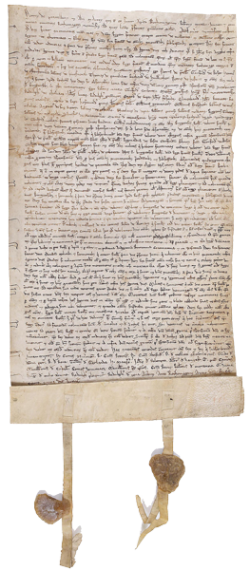Pierre de Preaux, who died in 1212, was a Norman knight in the service of the early kings of England. Osbert, Pierre's father, was a minor Norman baron in the neighborhood of Rouen, the capital of Normandy. He held the tower and ville of Preaux as well as land at Darnétal. Osbert also owned a scattering of manors in England.
Second son
Pierre, as the second son of the sire de Preaux, had few prospects for a landed estate. He, along with his brothers Jean, Guillaume, and Engleraw were part of the royal household from a very early age. Pierre would serve in succession, Henry II, Richard, and King John. Pierre and Guillaume were known throughout the tournament circuit of the day as fierce warriors and competent knights.
Third Crusade
Pierre and Guillaume accompanied Richard I on the Third Crusade in 1190. Pierre was assigned the dignity of royal standard-bearer over the hereditary standard-bearer of England, Robert Trussebut. Pierre and Guillaume were known to be with the King at Vezelay, Marseille, Sicily, the conquest of Cyprus, the Siege of Acre, the Battle of Arsuf, the march to Jaffa, the advance on Jerusalem, Darum, and the Battle of Jaffa.
Asleep on duty
After the truce had been established between Richard and Saladin, Pierre was assigned an important mission with other household knights. The crusading host had been permitted by the Muslims to complete the pilgrimage to Jerusalem. Pierre and his band were sent ahead of the first battalion to obtain safe conducts. According to the chronicle of the crusade attributed to Geoffrey of Vinsauf, Pierre fell asleep at one of the villages where he was to meet a Saracen embassy. The crusaders charged ahead without receiving their safe conducts. When Pierre and company woke, they realized that they were already behind the Christian host. Pierre made all haste to catch up. He was then reprimanded by the column's commander, the king's cousin, André de Chauvigny.
King Richard's last act before departing for Europe was to ransom Pierre's brother, Guillaume. He had been captured by Saladin's forces a year earlier while personally keeping the King from being captured. Pierre and Guillaume returned to Normandy in late 1192.
French service
Pierre served King Richard throughout his wars against Philip II of France, 1194-1199. During the last years of Angevin rule in Normandy 1202-1204, King John made both Pierre and Guillaume important territorial military governors in Normandy. Pierre had responsibility for the Channel Islands and Guillaume was made bailiff of the Oximin.
Channel Islands
Pierre de Préaux was appointed Seigneur des Iles by a Charter of King John on 14 January 1200, renewed on 21 June of the same year. For this he owed the King the service of three Knights. It was a temporary appointment, with the king retaining the right to replace de Préaux while providing for him otherwise.
Two orders issued by the King to de Préaux on 12 November 1201 and 13 August 1202 survive, as well as a Charter of de Préaux of 1203 by which he gave the Ecrehous to the Abbey of Val Richer to establish a priory. In one of the 1201 documents de Préaux is referred to as Ballivus, which is the first recorded use of the Latin equivalent of Bailiff in relation to the Channel Islands. He is not, however, generally recognised as the island's first Bailiff, a role which does not emerge until later in the 13th century.
Pierre de Préaux's seal of office is in the French National Archive
Rouen surrenders
By December of 1203, King John left an already invaded Normandy, never to return. Jean de Préeux sided at this point with Philip of France. King John had left Pierre in charge of the defence of Rouen. His force included Henri d'Estouteville, Robert d'Esneval, Richard de Villequier, Thomas de Pavilly, Peter de Hotot and many knights of Jean, who did not follow their lord into his treason against King John.
By spring of 1204, Rouen was surrounded by the forces of the King of France. Normandy had been lost. Pierre, in agreement with the leading men of the city, surrendered to Philip of France and then sailed to England.
After Normandy
Some reports say that he fell out with his king, others that he was well received. He was granted some of the land of his brother Jean as Terra Normanorum. In addition, Pierre was married to Mary de Redvers, daughter of the Earl of Devon and the Isle of Wight. He retired to a quiet life on his new English estates and probably had no further connection with the Channel Islands, where he was replaced as Warden by Hasculf du Suligny. It is believed that he died sometime in the year 1212.
In a charter of 18 March 1216 King John gave various land to Guillaume de Préaux (possibly Pierre's son) and promised, if this gift could not be fulfilled, to give him the Channel Islands "vel reddere eidem insulas de Geresye, faciendo inde nobis servicium ad predictas insulas pertinens". This promise of the islands seems to have come to nothing.
Notes and references
| Predecessor | Successor | |
| Pierre de Préaux abt 1201 |
Drouet de Barentin Abt 1258 | |
| Predecessor | Successor | |
| King John 1198-1199 |
Pierre de Préaux 1200-1206 |
Henri de Trubleville 1230–1232, 1234-1239 |

